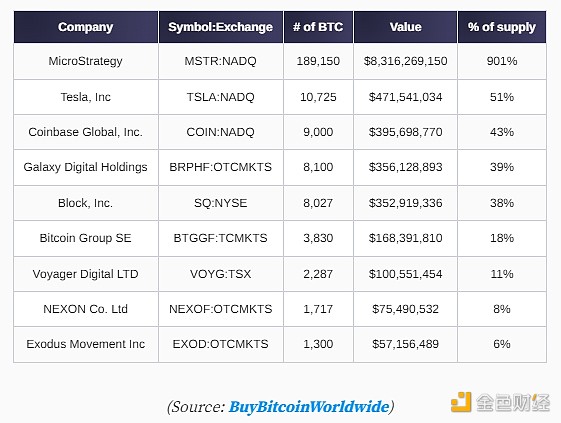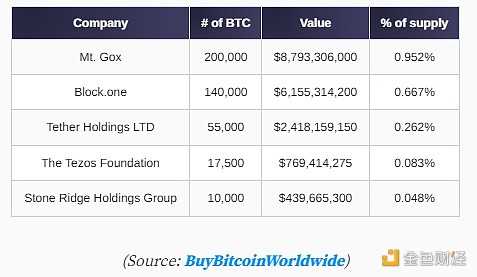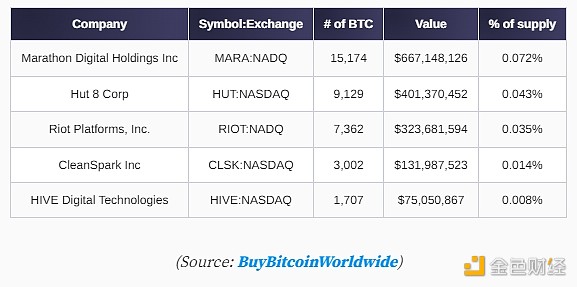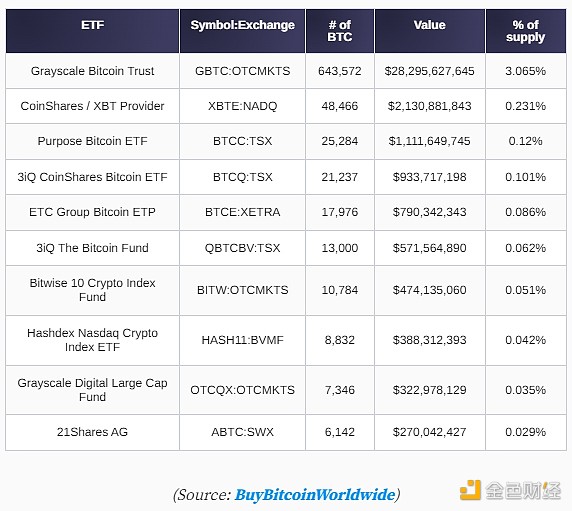Author: Andjela Radmilac, Cryptoslate; Compiler: Songxue, Golden Finance
Foreword:
Bitcoin’s market leading position in the encryption industry cannot be underestimated. The importance of tracking the largest Bitcoin holders lies in their outsized influence on market trends and investor confidence. This report focuses on parsing the holdings of various entities (public companies, private companies, countries, exchange-traded funds (ETFs), and mining companies) to gain a comprehensive understanding of their impact on the Bitcoin market.
Public companies with Bitcoin investments have the potential to shape market sentiment, as their relationship with Bitcoin is not just a diversification strategy, but is often strategically aligned with the future of crypto. Although less transparent than their public counterparts, private companies also play a key role. While not immediately apparent in market volatility, the holdings of these companies have an impact on the underlying demand for Bitcoin.
ETFs are critical to providing broader market access for Bitcoin. Countries that have included Bitcoin in their national fiscal reserves have demonstrated its growing acceptance and potential as a hedge against traditional currency fluctuations. Bitcoin reserves accumulated through mining activities allow mining companies to directly influence the supply side of the Bitcoin market. Their decision to hold or sell Bitcoin can immediately affect its supply and, therefore, its price.
In this report, CryptoSlate takes a deep dive into the largest Bitcoin holders to gain insight into the impact all these entities may have on the Bitcoin market.
Public companies
Public companies have become important players in the Bitcoin ecosystem. There are implications for its stock performance and the broader cryptocurrency market.
One of the most important companies is MicroStrategy, a business intelligence company holding 189,150 Bitcoins with a market capitalization of approximately 82 .One hundred million U.S. dollars. This accounts for approximately 0.901% of the total Bitcoin supply (a total of 21 million Bitcoins that will exist). MicroStrategy's aggressive Bitcoin acquisition strategy has made its stock (MSTR:NADQ) an alternative to Bitcoin, with its share price often reflecting the volatility of the cryptocurrency market.
Tesla (Tesla), the electric vehicle and clean energy company, holds 10,725 Bitcoins, worth approx. $471 million. The company's Bitcoin investment disclosed in early 2021 was an important recognition of Bitcoin's potential as a store of value, with implications for both crypto and traditional financial markets. Tesla's stock (TSLA:NADQ) has since been affected by Bitcoin price volatility, reflecting the correlation between its investment and market capitalization.
Coinbase Global, a cryptocurrency trading platform, holds 9,000 Bitcoins worth approximately $395.7 million. As a major player in the cryptocurrency trading industry, Coinbase's (COIN:NADQ) holdings are an asset on its balance sheet and strategically aligned with its core business operations. The company’s stock performance is closely tied to the health of the crypto market, with Bitcoin’s price being a key driver.
Galaxy Digital Holdings is a commercial bank focusing on digital assets and blockchain, holding 8,100 Bitcoins worth approximately $356.13 million. Galaxy Digital's stock (BRPHF:OTCMKTS) reflects its deep involvement in the cryptocurrency space, with Bitcoin's performance directly affecting its valuation.
Block, Inc. (formerly Square, Inc.), a financial services and mobile payments company, holds 8,027 Bitcoins worth approximately $352.92 million. Block's investment (SQ: NYSE) underscores its commitment to integrating cryptocurrencies into its broader payments ecosystem. The company’s Bitcoin holdings and its growth in the crypto space significantly impact its stock performance.
These firms’ investment choices in Bitcoin underscore a trend toward broader institutional acceptance of cryptocurrencies. Their large holdings indicate a strategic bet on Bitcoin’s long-term value proposition. This trend reflects growing confidence in Bitcoin as an asset class.

Private company
In the private sector, some companies have accumulated large amounts of Bitcoin, reflecting a strategic shift toward digital assets. These investments are driven by a variety of factors, including belief in Bitcoin's long-term value, its potential as a hedge against inflation, and a desire to be part of a booming digital economy.
Mt. Gox Originally a major Bitcoin exchange, it currently holds approximately 200,000 Bitcoins worth approximately $8.79 billion. This holding represents 0.952% of the total Bitcoin supply. Mt. Gox’s Bitcoin holdings are primarily due to historical operational activity and have been the focus of legal and financial discussions following its infamous hack and subsequent bankruptcy.
Block.one is a software company focusing on high-performance blockchain technology. It holds 140,000 Bitcoins worth approximately US$6.16 billion, accounting for the total Bitcoin supply. 0.667% of the amount. This investment demonstrates Block.one’s strong commitment to the blockchain ecosystem and belief in Bitcoin as the reserve asset of the future.
Tether Holdings LTD holds 55,000 BTC worth approximately $2.42 billion, accounting for 0.262% of the total supply. The holding demonstrates Tether’s strategic position in the cryptocurrency market, balancing its stablecoin business with its heavy investment in Bitcoin.
Tezos The Foundation holds 17,500 BTC, worth approximately $769.41 million, or 0.083% of the total Bitcoin supply. Stone Ridge Holdings Group is an asset management company specializing in alternative investments. It holds 10,000 Bitcoins worth approximately $439.67 million, accounting for 0.048% of the total Bitcoin supply. Their investment in Bitcoin is part of a broader strategy to diversify their portfolio.
The rationale behind these investments varies, but generally reflects a belief in the digital transformation of finance and Bitcoin’s role as an underlying asset in this transformation. These private holdings are significant because they indicate growing institutional acceptance of Bitcoin.
Although not as high-profile as investing in public companies, these holdings contribute to the stability and maturity of the overall market. They also shape investor sentiment, reinforcing the perception of Bitcoin as a viable and valuable asset class.

Mining CompanyMining Company h2>
Mining companies play a vital role in the Bitcoin ecosystem in terms of network security and influencing the market through Bitcoin reserves.
Marathon is a leader in the mining space, holding approximately 15,174 BTC worth approximately $667.15 million. This represents 0.072% of the total Bitcoin supply. Marathon’s strategy of accumulating Bitcoin rather than selling it for operating expenses reflects a long-term investment perspective and belief in Bitcoin’s value.
Another significant player, Hut 8, has accumulated 9,129 BTC worth approximately $401.37 million, accounting for 0.043% of the total Bitcoin supply. Riot Platforms has 7,362 BTC in reserve, worth approximately $323.68 million, or 0.035% of the total Bitcoin supply. Riot’s strategy signals a bullish stance on Bitcoin and focuses on strengthening its mining operations.
There is a balance between mining activities and reserve accumulation. On the one hand, mining companies must sell part of the mined Bitcoin to pay for operating costs, including electricity, hardware maintenance, and expansion.
On the other hand, holding mined Bitcoins can be seen as a vote of confidence in the future value of the cryptocurrency. This strategy not only affects the supply side of Bitcoin, but also reflects miners’ views on market trends.
Additionally, these assets play a critical role in the security and robustness of the Bitcoin network. By reinvesting profits into expanding mining operations, these companies help maintain a high hash rate, which is crucial for network security.

ETF
Exchange-traded funds (ETFs) are important tools in financial markets, bridging the gap between traditional investment mechanisms and innovative digital assets such as Bitcoin.
The well-known Bitcoin ETF has accumulated large Bitcoin holdings and plays an important role in the cryptocurrency market. The largest Bitcoin ETF, Grayscale Bitcoin Trust, holds 643,572 Bitcoins worth approximately $28.3 billion. This represents approximately 3.065% of the total Bitcoin supply. Other notable ETFs include the CoinShares/XBT Provider and Purpose Bitcoin ETF, which themselves hold large holdings.
These ETFs enhance market access and enable a broader range of investors to participate in Bitcoin investing. These ETFs provide exposure to Bitcoin through traditional investment platforms, thereby enhancing liquidity. This liquidity is crucial because it smoothes price movements and reduces volatility, making Bitcoin a more accessible and potentially stable investment option.
Additionally, the presence of Bitcoin in these ETFs influences investor behavior by providing a regulated and familiar avenue for investment. This can enhance investor confidence and attract more institutional and retail investors into the Bitcoin market.
The first spot Bitcoin ETF is expected to be approved in the United States in January, a significant development. This approval is expected to have a significant impact on the market. This could lead to an influx of new investment because, unlike current futures-based ETFs, a spot Bitcoin ETF would provide direct exposure to Bitcoin price movements.
This may further enhance liquidity and potentially stabilize Bitcoin prices. Additionally, the approval would signal regulatory acceptance, potentially paving the way for wider adoption of Bitcoin and other cryptocurrencies.

Conclusion
Through its significant holdings and strategic investments, thelisted company highlights Bitcoin’s increasing integration within traditional financial frameworks, influencing market dynamics and investor sentiment. Although less visible, private companies support underlying demand for Bitcoin through their significant investments, strengthening its long-term value proposition.
By maintaining large reserves of Bitcoin, mining companies stabilize the supply side of the market and strengthen the security of the Bitcoin network, which is critical to its continued operation and credibility. It's important. The foray into Bitcoin-holding countries marks a paradigm shift that reflects Bitcoin’s growing acceptance as a viable asset class at the government level and could influence regulatory views around the world.
ETFs have become a key mechanism to improve Bitcoin’s market accessibility and liquidity. They bridge the gap between traditional finance and the booming cryptocurrency sector, helping to stabilize markets and shape investor behavior.
Looking forward,the collective impact of these entities may push Bitcoin in the direction of greater institutionalization and mainstream acceptance. Bitcoin’s growing convergence with traditional financial assets points to a future in which Bitcoin’s role is not just a speculative asset, but a fundamental element in a diversified investment portfolio.
This evolution points to an increasingly complex and integrated financial ecosystem, where digital assets such as Bitcoin coexist with traditional financial instruments, providing a wider range of investment opportunities and risk management strategies.
 JinseFinance
JinseFinance
 JinseFinance
JinseFinance JinseFinance
JinseFinance JinseFinance
JinseFinance Huang Bo
Huang Bo Beincrypto
Beincrypto Clement
Clement Catherine
Catherine M Vision PLC
M Vision PLC Coindesk
Coindesk Cointelegraph
Cointelegraph